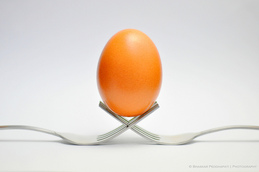 The old saying goes you should breakfast like a King, lunch like a Prince and dine like a pauper. Breakfast may be the most important meal of the day but now it turns out that it's effects reach far beyond the breakfast table. What you eat for breakfast influences not only how full you feel at the time but how much food you eat for lunch and dinner. So what's the best breakfast? A poached egg, a bowel of cereal and a slice of toast or something more continental - a croissant with butter and jam perhaps? Researchers at the University of Surrey have been looking at whether what you eat at breakfast alters how hungry you feel later in the day. They randomly assigned three groups of students to different breakfasts all containing 330 kilocalories. The breakfasts were either two poached eggs on a slice of white toast or a bowl of cornflakes with semi-skimmed milk, a slice of white toast or a croissant with butter and jam and orange juice. For lunch the students were offered a buffet of cheese sandwiches, plain crisps and water. For dinner they were offered a buffet of pasta and a tomato sauce and cheese and water. The amount of lunch and dinner they took from the buffet was recorded as were scores of hunger and fullness during the day. Their results showed that the egg breakfast made people feel significantly fuller for longer and reduced the amount of lunch and dinner taken from the buffet. The proportion of fat and protein in the egg breakfast was higher and the carbohydrate content lower than the other breakfasts. It is known that high-protein foods make you feel fuller than high fat or carbohydrate ones and show the importance of food choice at breakfast. But hold on I hear you say can a cardiologist really be recommending that people eat eggs. In the 1960's the Egg Marketing Board ran a highly successful campaign called "Go to work on an Egg" but with the demonization of saturated fat in the 1970's and 80's, eggs with their high cholesterol content were rejected in favour of high carbohydrate breakfast cereals. Well it turns out that your more likely to raise your cholesterol by eating butter on your toast than from the cholesterol in an egg. In a large meta-analysis published in the BMJ looking at 17 reports on data from 4 million people there was no evidence of an association between egg consumption and risk of coronary heart disease or stroke and now even the British Heart Foundation is now promoting the consumption of eggs. So this means you can go to work on an egg if you want to and it might well help you lose weight by reducing the size of your lunch and dinner.
0 Comments
|
Dr Richard BogleThe opinions expressed in this blog are strictly those of the author and should not be construed as the opinion or policy of my employers nor recommendations for your care or anyone else's. Always seek professional guidance instead. Archives
August 2023
Categories
All
|
 RSS Feed
RSS Feed

